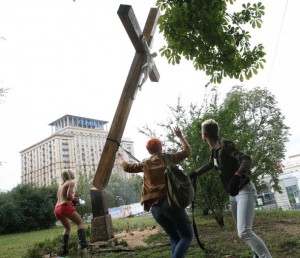 Cross-posted on the Corner:
Cross-posted on the Corner:
Two years: That was the jail term imposed on those three Russian ladies who performed under a name infinitely less obscene than their sentence:
The Guardian reports:
The judge said in the verdict that the three band members “committed hooliganism driven by religious hatred” and offended religious believers. The trio were arrested in March after a guerrilla performance in Moscow’s main cathedral calling for the Virgin Mary to protect Russia against Vladimir Putin, who was elected to a new term as Russia’s president two weeks later. Russian police have rounded up… protesters, including the former world chess champion Garry Kasparov and leftist opposition group leader Sergei Udaltsov after one of the most closely watched court cases in recent Russian history.
High Tory blogger Cranmer weighs in, throwing in a characteristically canonical note (I’ll have to take his word for its accuracy) as he does so:
In summing up the prosecution case, Judge Marina Syrova confirmed the tangential theological argument that prayers in a Russian cathedral may only be offered by a priest and not by ‘ordinary members of the public’, so [the] professed protest-as-prayer was contrary to church rules. But this is simply not true: Orthodoxy permits laity to lead public prayer. Perhaps it would not bestow the honour upon rabid feminists, but there is no canonical prohibition. The Judge observed: “It was a small act but maybe not a very elegant act but they consider that it is the country which is sick. For them, individuals are not important, they consider that education in Russia is still in the Soviet mould. And that there is still cruelty in the country and that prison is a miniature of Russia itself.”
If education is no longer in the Soviet mould, justice certainly appears to be. Putin’s Russia has regressed to the Soviet era: he is forging another oppressive kleptocracy which routinely persecutes the unorthodox and crushes dissent. It might even feel like theocracy. Some of the prosecution witnesses were not actually in the Cathedral at the time of the protest, but told the Court they were offended by the YouTube recording. The Judge described them all as ‘good Christians’, based on nothing but their ‘right’ testimony. Thus the actions of [these women] ‘degraded the moral feeling’ of the victims, who are the Orthodox everywhere for all time.
And here’s the Daily Telegraph’s Michael Weiss:
Despite the fact that this trial sought to portray [the defendants] as a trio of Satanic lesbians – the judge reading her verdict said they were peddling “homosexual propaganda” – their real crime was hitting Vladimir Putin in the one place he’s seldom hit: his cynical manipulation of Russian Orthodoxy. According to Andrei Soldatov and Irina Borogan, authors of The New Nobility: The Restoration of Russia’s Security State and the Enduring Legacy of the KGB, the clerical establishment is barely distinguishable from an apparatus of state security. “Russia’s brand of orthodoxy is based on the concept that Moscow is ‘the Third Rome’ (after Rome and Constantinople) and on a belief in Russian uniqueness. Being ‘unique’, Russia sees itself as surrounded by numerous enemies that the FSB must combat…The FSB helps to protect the Orthodox sphere of influence against Western proselytizing, and in return the Church blesses the security service in its struggles with enemies of the state.”
…In its role as helpmeet of the prosecution, the Church cited John 10:33 …a verse that was even included in [the defendants’] criminal file: “For a good work we stone thee not; but for blasphemy; and because that thou, being a man, makest thyself God.” It should be a fair sign of how demented, stupid and self-destructive Putin’s regime has become that it now readily identifies its victims with Jesus Christ.
And for a somewhat contrarian view, try Brendan O’Neill, also at the Daily Telegraph, who argues that the Western campaign doomed the women by making it impossible for Putin to climb down. I’m not convinced, to put it mildly. If I had to guess—and what else can I do—the intense foreign scrutiny has meant that the sentence was less than it would otherwise have been. It may also keep them alive.
When it comes to this, however, O’Neill has a point:
The fashionable Western support…had all the hallmarks of a cause célèbre. First there was the campaigners’ selection and elevation of just one foreign instance of shocking censorship to the exclusion of all others – such as Rwandan president Paul Kagame’s branding of anyone who criticises him as a “genocide ideologist” who can be locked up, for example, or nearby Scotland’s recent passing of an anti-football fan bill that can also send people to prison for singing songs (though sectarian rather than punk ones).
Quite.
Europeans and (as Mark Steyn can, literally, testify) Canadians should ponder the extent to which their own hate speech legislation resembles the law under which Yekaterina Samutsevich, Maria Alyokhina and Nadezhda Tolokonnikova have been jailed. Americans, as always, should give thanks for the First Amendment.








